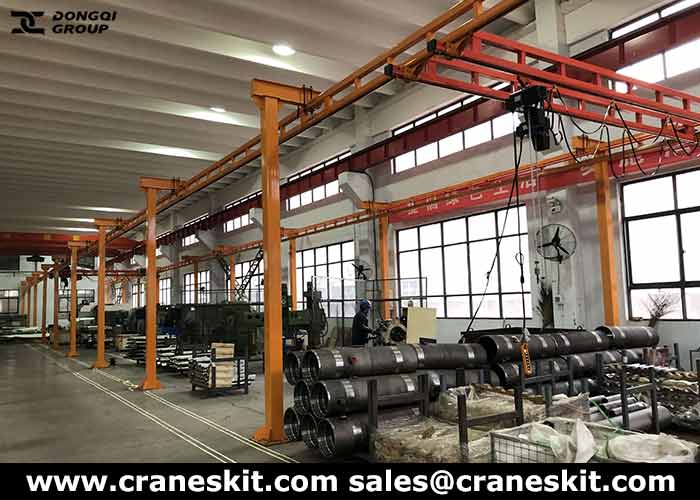Workstation cranes for material handling:
- To help workers lift, handle, and move heavy objects both safely and ergonomically, workstation crane machine can be installed within individual manufacturing and assembly work cells.
- Workstation cranes are dedicated to a specific area or location, are typically equipped with a electric hoist/manual hoist with holding and orienting devices such as grabs, spreader bars, custom magnets, etc.
- Designed to handle loads up to 2000-3000kgs, these systems reduce the physical exertion, fatigue, and risk of injuries associated with lifting and pushing or pulling loads.
- They also provide precise load positioning and improve productivity while enabling load handling to be managed by one individual, enhancing safe distancing practices.

DQCRANES offers workstation cranes including:
Freestanding: Also known as “floor mounted,” this style features supports that hold the crane in place by being securely mounted to the floor. Normally designed for a rectangular work area, these cranes put no stress on the building’s structure. These systems require a reinforced concrete floor and are easy to relocate if processes or production needs change.Ceiling Mounted: To keep the work area as open as possible, many companies turn to ceiling mounted cranes that place all parts above the work being performed. By mounting to the overhead support structure of the building, these cranes allow for more freedom of movement since the floor mounted support pillars are eliminated.
The selection of a floor mounted workstation crane versus a ceiling mounted crane is based on numerous factors. Many older facilities may not be able to adequately support a crane from the building’s structure, which eliminates the possibility of using the ceiling mounted crane. Additionally, depending on the work being performed, there may be numerous parts, lines, pipes, etc., already running overhead. At times, these can interfere with an overhead crane, and makes a floor-mounted system more appealing.
没有评论:
发表评论